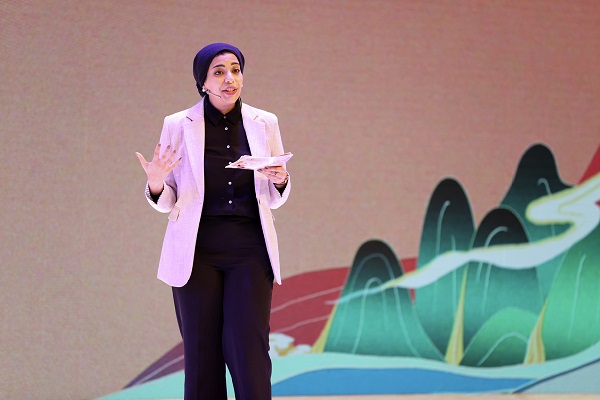
Mehad Mousa from Egypt gives a speech at the Vision China event. [Photo by Feng Yongbin/China Daily]
Taking the idea of promoting understanding between the peoples of China and the Middle East as her guiding principle, 26-year-old Mehad Mousa from Egypt has been working hard to translate Chinese literature into Arabic and conduct cross-cultural research in recent years.
Known in Chinese as Ai Xiaoying, Mousa is now a PhD researcher at Northwest University in Xi'an, Shaanxi province.
Despite her academic ability, she said that it's time-consuming and somewhat boring to translate Chinese literature.
"But it has opened my eyes to many different worlds and has helped me understand more about myself. This is why I'm grateful for what I do, and why I find such satisfaction in it," Mousa said. "I remember that Steve Jobs once said, 'Work is going to fill a large part of your life, and the only way to be truly satisfied is to do what you believe is great work, and the only way to do great work is to love what you do.' So, I hope that time will show that what I am engaged in now is my 'great work'."
Like many of her peers, Mousa once thought of China as a huge, well-known but somehow mysterious country, but what she has experienced since coming here has changed that view.
"The Chinese idiom 'seeing something once is better than hearing about it a hundred times' has become a truism for me," she explained.
Her new perspective encouraged her to share what she has learned about China, to reveal a more accurate image of the country through her translations and cross-cultural research.
"I (also) hope people will encounter an authentic image of the Middle East through my work," she said.
As a language learner and researcher, Mousa sees the relationship between China and the Middle East as positive and fruitful, both historically and in modern times.
"Going back many centuries, we can see that Middle Eastern people used to undertake long and difficult trips to China along the overland and maritime Silk Roads. They pioneered exchanges between the two regions, establishing a time-honored precedent," she said.
"Nowadays, China has opened its doors wide, and many students have traveled overseas to learn and study. Cultural exchanges between China and other countries have become more vibrant, and so the once strong ties between China and the Middle East have also gradually revived."
However, there remains much work to be done to consolidate understanding and friendship between the two.
"Misunderstandings and misconceptions persist in the minds of some, so we still have some progress to make before we can see each other in an authentic light, and from every perspective," she said. "The younger generation on both sides has a vital part to play. We need them to exert more effort in building friendships between the citizens of China and their counterparts in the Middle East."
This is one reason Mousa said she feels motivated to continue her translation work.
"In my opinion, translations are a basic guarantee for meaningful cultural exchange. I hope I can encourage more people to exchange translations between their countries and China."
Mousa has recently translated selected prose works by Jia Pingwa, one of China's most respected writers, and has received many warm and encouraging responses to the volume.
"This is the first time that his work has appeared in Arabic, and the book was published in Egypt several months ago… We can really make a difference and build more bridges between the Middle East and the Far East," she said.